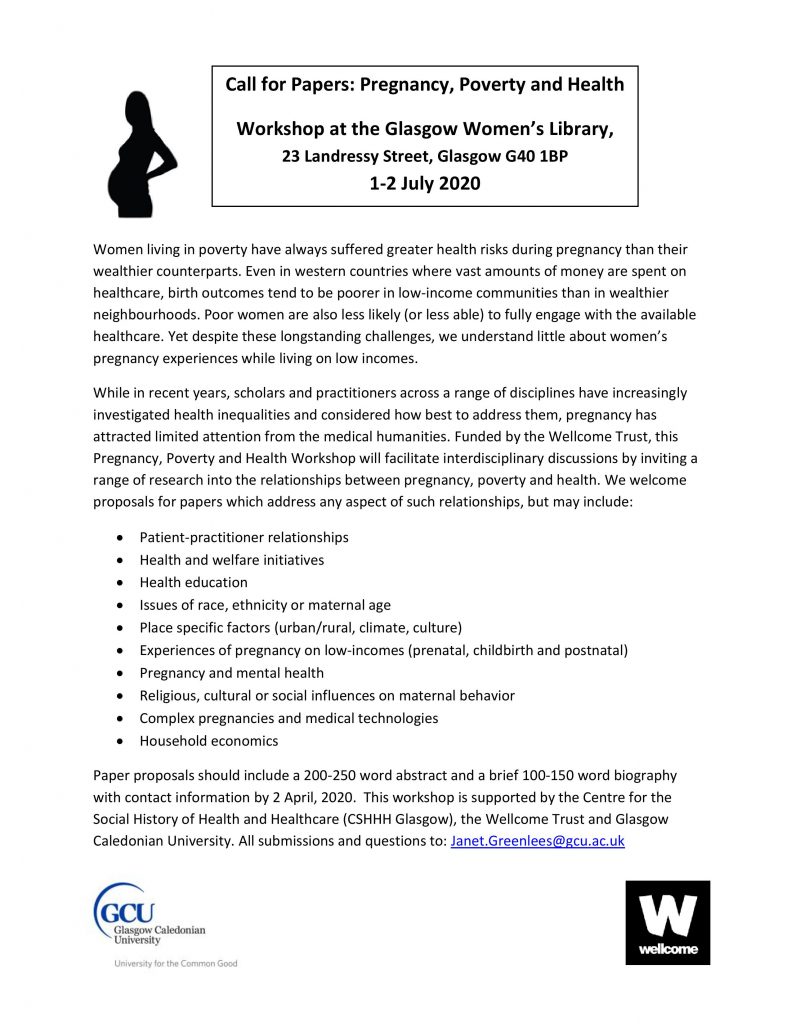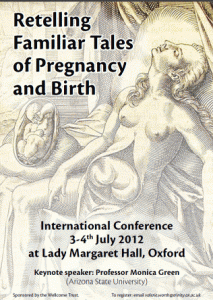
Tag Archives: pregnancy
Book review needed
Hearn, Karen (2020) Portraying Pregnancy: from Holbein to Social Media
We are seeking from among our membership a reviewer for this book, which is being published in conjunction with an exhibition of the same name at the Foundling Museum in London. The review will be published on the websites both of De Partu and of the British Society for the History of Medicine. Please email Alison Nuttall if you are interested: alison_m_nuttall@hotmail.com.
Hearn, Karen (2020). Portraying Pregnancy: from Holbein to Social Media
London: Paul Holberton Publishing
Paperback, 242 x 168 mm
144 pages, 60 illustrations
ISBN: 978-1-911300-80-9
Maternity Care and Childbirth in Women’s Prisons
Since the creation of the modern prison system in the mid-nineteenth century, women have been imprisoned separately from their male criminal counterparts. While some historical attention has been afforded to the running of female-only prisons and how this differed from the regimes imposed in male prisons, I am seeking to question if gender distinctions impacted upon the provision of medical care within female prisons. I work as a Research Fellow on the ‘Prisoners, Medical Care and Entitlement to Health in England and Ireland’ project, which is funded by a Wellcome Trust Senior Investigator Award. Please see our website Exploring the History of Prisoner Health for more information.
A major part of my research focuses upon maternity care and childbirth provisions and practices in women’s prisons between the mid-nineteenth century and the present. The research examines the conditions in which pregnant women were incarcerated. It draws upon evidence showing that the medical examination of women upon entry into the prison was often very brief and perfunctory. In addition, it shows that, until they were at a very advanced stage of pregnancy, women were often subject to the normal prison routine, including being locked in solitary confinement for long periods. This was liable to cause psychological stress exacerbated by the limited availability of emergency attention. Furthermore, it examines the extent to which there were specialised maternity facilities in prison hospitals as well as specially trained staff on hand to offer medical assistance to pregnant women. Within this, it questions if there were provisions in place for midwifery visits and contact with health visitors, particularly after the turn of the twentieth century.
Something I would very much like to do is establish contact with people, particularly midwives, who have experience of, or a research interest in, maternity and childbirth in English or Irish women’s prisons. Whether people have years of experience or only a small amount of experience, any information or experiences that people would like to share would be greatly appreciated. The kind of things I would be particularly interested in include: the treatment of pregnant inmates, including provisions for them to attend antenatal classes and if, and how, things such as their diet and exercise were tailored, or not, to their pregnancy. Under what conditions are pregnant women incarcerated and at what stage in their pregnancy would they be moved to hospital? In addition, I would be interested in any information regarding the conditions and care offered to women and their infants in Mother Baby Units in prisons.
Please do get in touch if you would like further information about the project or the research. In the meantime, I would very much like to hear from anyone who has an interest in maternity and midwifery care in prisons. You can contact me at r.bennett.2@warwick.ac.uk or through De Partu.
Thank you and I look forward to hearing from, and hopefully meeting, some of you soon!
Rachel
Retelling familiar tales of pregnancy and birth: Oxford 3rd-4th July 2012
This conference brings together leading specialists from a range of the medical humanities to explore the trope of the retelling of stories about pregnancy and birth. Taking a very broad geographic and chronological focus, our objective is to encourage innovative interdisciplinary exchanges by addressing the following questions:
How did/do methods of diffusion (print culture, images, drama, ultrasound and modern medical technologies) encourage the retelling of familiar birthing tales, and how were/are new ones added?
Why did/do some stories of pregnancy and birth circulate more widely than others?
When stories are retold, which details of the original are always retained, which are lost in the retelling, and how and why do new accretions creep into the story?
Papers by some twenty researchers, from humanities, social sciences and health care, will be given over the two days, with generous time allowed for audience discussion and questions. We are grateful to the Wellcome Trust for a grant subsidising the conference.
Janette Allotey (Manchester), Helen King (Open University) Valerie Worth (Oxford)
Provisional programmeas (6/6/12)
Day 1:
11-12.15
Opening session: organisers’ introduction
Sharon Aviva Jones (Applied Drama, Goldsmith’s, London), ‘The Performance of Childbirth: Birth Stories and Rites of Passage in the UK today’
Lisa Hinton (Health Experiences Research Group, Oxford), ‘Healthtalkonline and stories of birth’
12.15 lunch
14.00 Birth in fiction
Véronique Duché (Languages and Literatures, Melbourne), ‘The birth of/in French fiction (16th Century)’
Charlotte Woodford (German, Cambridge), ‘Feminist re-tellings of pregnancy and birth experiences in fin de siècle Germany’
Giulia Zanini (Political and Social Sciences, Fiesole, Italy – PhD) ‘“The most beautiful thing that I remember about my childhood is the story of my birth”. Italian intended parents of donor-conceived children and the creation of family histories and fairy tales’
15.30 teabreak
16.00 Telling tales under God
Rebecca Johnson (History, Princeton, US – PhD), ‘Dolores spatio quatuor dierum: Approaching Childbirth in Medieval Catalonia through a Miracle Attributed to Ramon de Peñafort’
Vina Vaswani (Director, Centre for Ethics, Yenepoya University, Mangalore, India), ‘Reinforcing values in the birth of a baby through mythological/folk tales’
17.00 Keynote, Monica Green (History, Arizona), “The Travels of Muscio: Making Medieval Obstetrics out of a Late Ancient Text”
Day 2:
9.30 The father’s tale
Holly Tucker (French and Italian/History of Medicine, Vanderbilt University, US), ‘Pregnant Men?: Stories of Atypical Reproduction in Early Europe’
Angela Davis and Laura King (History, Warwick), ‘Figure of Fun to Birthing Partner? Childbirth stories of and by fathers in post-war Britain’
11.15 coffee
11.30 Unusual births or mothers
Theresa Earenfight (History, Seattle), ‘Narratives of Regal Maternity in Late Medieval and Early Modern Spain’
12.00 Midwives’ responses
Round table discussion
12.30 lunch
14.00 Powerful stories
The eighth-month-child: Lesley Bolton (Classics, Calgary), ‘The eighth-month child: Recasting an old medics’ tale: transmission and transformation of theories on inauspicious periods of gestation’
The wandering womb: Alison Klairmont Lingo (History, University of California, Berkeley) and Stephanie O’Hara (French/Women’s and Gender Studies) University of Massachusetts Dartmouth), ‘Capturing the Wandering Womb in the Early Modern Era: Louise Bourgeois and The Compleat Midwifes Practice’
15.15 tea
15.45 Tales from the experts
The gynaecologist: Ramona A. Braun (History and Philosophy of Science, Cambridge), ‘Against the timebomb: Laparoscopic treatment of the ‘disease’ of ectopic pregnancy in gynaecologists’ accounts of the 1950s’
The German ‘family midwife’: Jennifer Jaque-Rodney (International Delegate –
German Association of Midwives), ‘Family midwifery. Health promotion through bonding for mother and child’
The doula: Holly Hendry and Dr Salma Siddique (Life, Sport and Social Sciences, Edinburgh Napier) ‘Stories retold in the spaces between pregnancy and childbirth’
17.30 Midwives’ panel and general discussion
Practical details
1) Dates and venue:
The conference will take place in Lady Margaret Hall, one of the colleges of Oxford University, on 3rd and 4th July 2012. Oxford is easily accessible by train or coach, and it is a 20-minute walk from the station to Lady Margaret Hall (or a short taxi ride). ). If you are arriving at Heathrow, there are regular buses to Oxford (Gloucester Green is the terminal you need in the city centre). If you are arriving by car, we recommend you park in one of the city’s ‘park and ride’ car parks, as parking in the city centre is extremely limited!
2) Accommodation
The conference organisers are able to provide accommodation (in single rooms) for those giving papers at one of the north Oxford properties belonging to Trinity College. Other delegates might wish to use the website of rooms available at Oxford colleges to make their own accommodation bookings: http://www.oxfordrooms.co.uk/. Alternatively, information on hotels is available on Oxford city’s tourist website.
3) Registration:
To register for the conference, please book completing the booking form and emailing it back to valerie.worth@mod-langs.ox.ac.uk by Friday 8th June 2012. Please note that the number of delegates attending is limited, so early booking is advised.
Payment should be made either by cheque (made payable to Trinity College Oxford), drawn on a UK bank, or by debit or credit card (charges to be handled by Trinity College Oxford). Once bookings have closed, you will be sent an email asking you to pay the total due for all bookings by Monday 19th June.
“They gave us hope again”: Dachau concentration camp memorial site
On the 29th of April, which is the 65th anniversary of the liberation of the Dachau Concentration Camp, the exhibition “They gave us hope again” was opened at the Dachau Concentration Camp Memorial Site. The exhibition is dedicated to an historical aspect of the Dachau Concentration Camp which has received only little consideration hitherto: the fate of female prisoners, among whom there were also pregnant women. Between December 1944 and February 1945, seven Jewish women brought children into the world amidst the terror at Kaufering I, a satellite camp of the Dachau Concentration Camp – all of them survived.
While pregnancies were not uncommon in concentration camps, women and their children were usually murdered. In order to clarify the exceptionality of these seven mothers surviving in the murderous concentration camp system, the exhibition implements the stories of the persecution of these women in historical context.
The biographies of the women are presented in seven parts: life before deportation, arrival and imprisonment at the concentration camps Auschwitz and Plaszów, transfer to the Dachau satellite camps, their experiences as female prisoners, the discovery and handling of their pregnancy and the births of their children at Kaufering I, the conduct of the SS, the evacuation of the camp and their liberation in Dachau as well as their lives after the Holocaust. All seven women were from Hungary or from regions annexed by Hungary and were already pregnant at the time of their deportation. They survived the selection process at Auschwitz and other concentration camps until arriving at the Dachau satellite camp Kaufering I in early December 1944, after discovering the pregnancy. They brought their children into the world there under catastrophic conditions.
After giving birth, the mothers Eva Fleischmannovà, Sara Grün, Ibolya Kovács, Elisabeth Legmann, Dora Löwy, Magda Schwartz and Miriam Rosenthal formed a so-called Schwangerenkommando (pregnant unit) and were forced to work in the prisoners’ laundry. As late as 13 March 1945, the head SS camp physician at the Dachau Concentration Camp issued an order for the mothers to be transferred to the Bergen-Belsen death camp. The order, however, was not carried out.
The exhibition can be visited from 30th April 2010 to 31st May 2011.
Guided tours for groups through the exhibition can be requested under: bildung@kz-gedenkstaette-dachau.de
Dachau Concentration Camp Memorial Site
Alte Römerstraße 75
85221 Dachau


